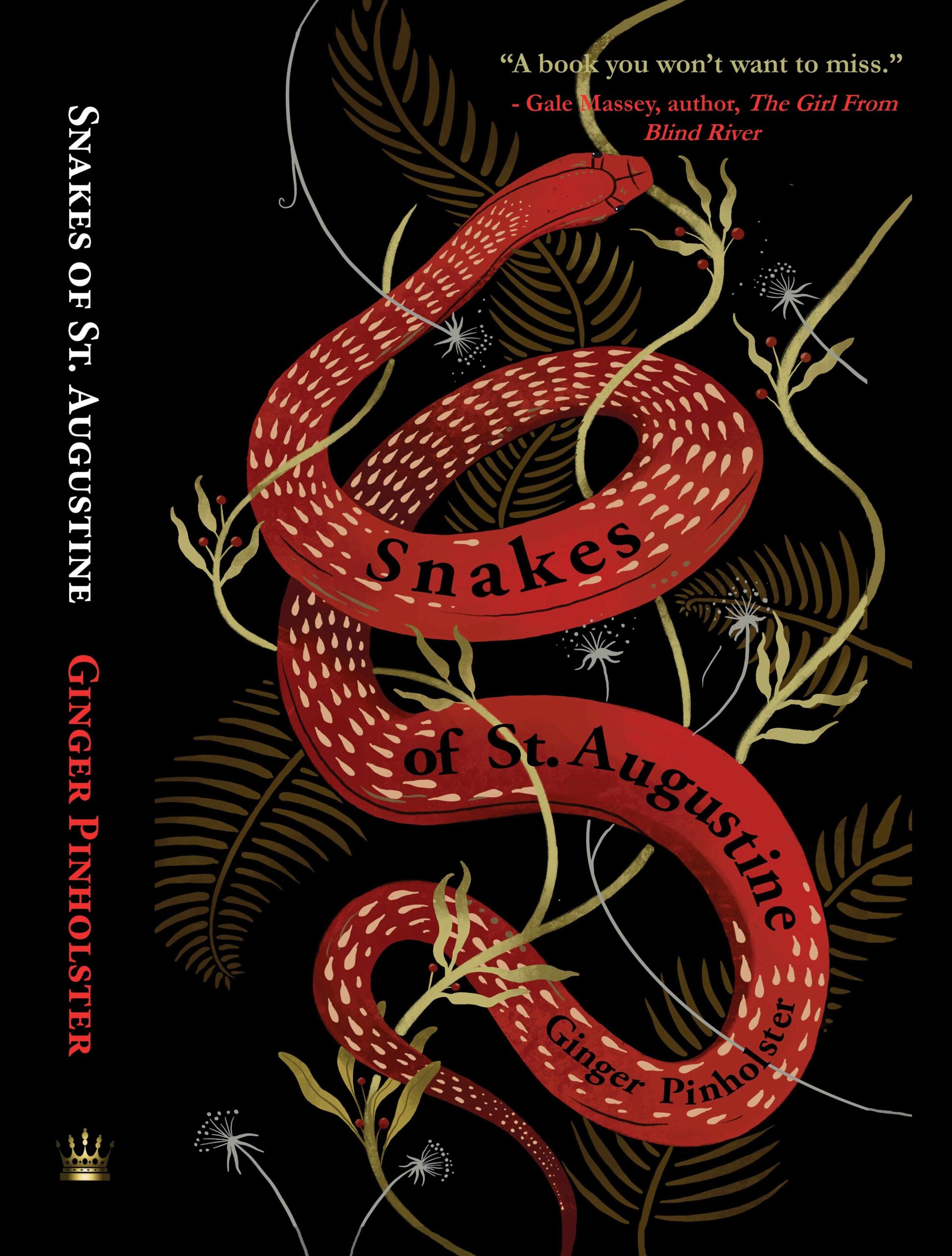Editor’s Note: This exchange is part of a series of brief interviews with emerging writers of recent or forthcoming books. If you enjoyed it, please visit other interviews in the I’ve Got Questions feature.
- What’s the title of your book? Fiction? Nonfiction? Poetry? Who is the publisher and what’s the publication date?
Title: Snakes of St. Augustine
Genre: Fiction
Publisher: Regal House Publishing
Publication Date: September 13, 2023
- In a couple of sentences, what’s the book about?
Snakes of St. Augustine, a love story served up with a large side of Florida weirdness, focuses on a woman’s quest to save her troubled brother, Gethin, and her magical, maddening entanglement with an equally complicated man named Jazz. Gethin’s disappearance coincides with the theft of Trina Leigh Dean’s beloved snakes. Trina’s friend Fletch, a burnt-out cop, searches for the stolen snakes, putting him on a dangerous collision course with Gethin and raising questions about the power of compassion.
- What’s the book’s genre (for fiction and nonfiction) or primary style (for poetry)?
Literary fiction.
- What’s the nicest thing anyone has said about the book so far?
Novelist Connie May Fowler (A Million Fragile Bones) said: “Snakes of St. Augustine is a relentlessly beautiful and compelling story. Ginger Pinholster sees into the hearts, minds, and souls of her vast and varied cast of characters with grace, insight, and humor. This novel will linger with readers long after the final page is read.”
- What book or books is yours comparable to or a cross between? [Is your book like Moby Dick or maybe it’s more like Frankenstein meets Peter Pan?]
In writing Snakes of St. Augustine, I was influenced by two books. in particular: We Are Called to Rise, by Laura McBride, and Pigs in Heaven, by Barbara Kingsolver. Both of those novels feature a diverse cast of characters and focus on the healing power of community. Snakes of St. Augustine explores how discrimination and stigma too often turn those with differences into “The Others,” and the importance of compassion and inclusion.
- Why this book? Why now?
When I saw a CNN news report of Dallas police shooting and killing Jason Harrison on June 14, 2014, the tragedy stuck in my head. Harrison’s mother had called the police because she needed help getting “Jay” to a hospital. Seconds after arriving on the scene, police shot the 39-year-old schizophrenic man five times, including twice in the back, according to CNN. Police bodycam video shows Harrison falling a few feet from his mother, who begins wailing, “Oh, they killed my son.”
Even now, this news report brings me to tears, especially because Harrison’s death was part of a broader trend: Of 994 people who were shot and killed by police officers in 2015, at least 25 percent suffered from acute mental illness at the time of their death, the Washington Post has reported. People with untreated mental illness are 16 times more likely to be shot and killed during an encounter with police, the Treatment Advocacy Center found.
The police bodycam footage of Jason Harrison’s death reminded me of loved ones, including my late brother John. He had a learning disability, attention deficit disorder, trouble communicating, severe anxiety and depression, and in the end, a substance abuse problem. He was 28 when he killed himself.
In writing my novel, I did not attempt to recreate any specific event. In no way do the family members and police officers in my book resemble the real-life players in Jason Harrison’s tragic death. All of my characters are composites, representing two trends: Individuals with mental health conditions who die during police encounters, and burnt out police officers who face dangerous situations without the proper training or tools.
Snakes of St. Augustine is fictional, but losing my brother to mental illness and subsequently finding a partner who has neurodiversity clearly influenced me. In my experience, discrimination can marginalize those with mental health conditions. To learn more, I read journal and news articles. I spoke with my partner Michele’s doctors as well as my sister, a mental health professional, about schizoaffective disorder. I learned that people living with psychosis are far more likely to be attacked, compared with the rest of us. Sadly, many police units lack the training or personnel to safely deal with individuals who have neurodiversity.
My novel is not about Jay, John, or Michele; all of my characters are composites, representing the trend of fatal encounters between police and individuals with mental health conditions.
- Other than writing this book, what’s the best job you’ve ever had?
I worked for 17 years as the chief communications officer for Science magazine and its publisher, the American Association for the Advancement of Science (“Triple-A-S”). It was an exciting, fast-paced job where I learned to write about science and technology and traveled all over the world. Aside from the AAAS, however, my favorite job was working as a reporter at the now-defunct Athens Daily News of Athens, Georgia. I only worked there for two years in my mid-20s, as a courts-and-cops reporter on the night shift, but I made some of the best friends of my life there. That was during the heyday of Athens as an artistic hub, where the B-52s and many other artists established roots.
- What do you want readers to take away from the book?
I hope my work will honor the lives of all those living with neurodiversity and an increased risk of harm. If some people feel more tolerance of those with “differences,” after reading my book, I would be very happy.
- What food and/or music do you associate with the book?
Tacos! My main characters, Jazz and Serena, first get to know each other while munching a meal from a fast-food joint.
- What book(s) are you reading currently?
Here in the Darkby Meagan Lucas and The Windward Road by Archie Carr.
Learn more about Ginger on her website.
Follow her on Twitter, Instagram, Facebook, and TikTok.
Buy the book from the publisher (Regal House Publishing), Bookshop.org, Amazon, or Barnes & Noble.



A compelling plot—violence against the mentally ill is way too common—we need to keep shining the light on the issue.